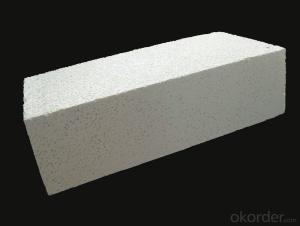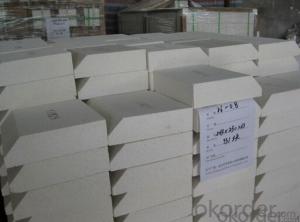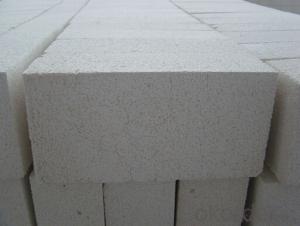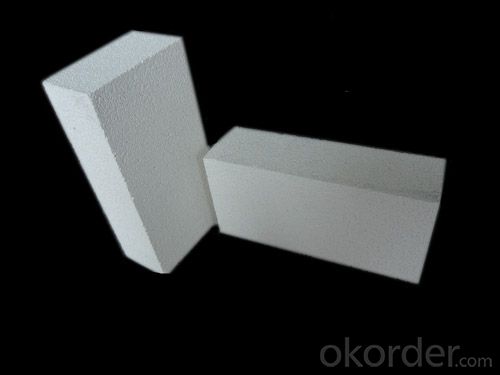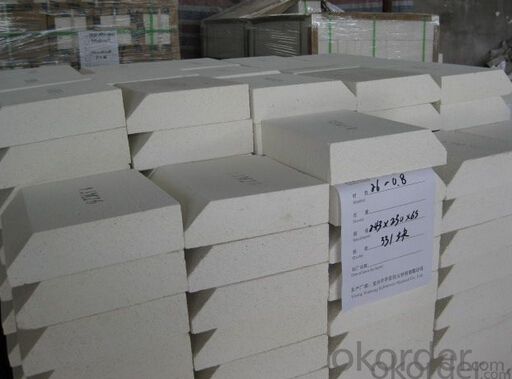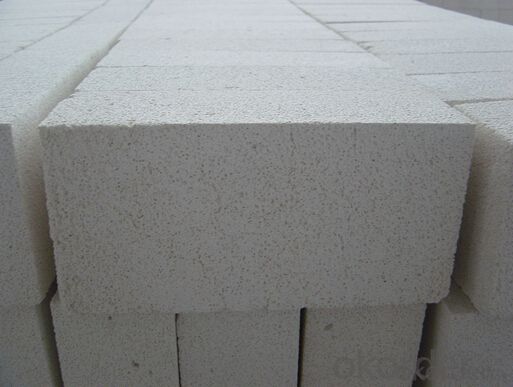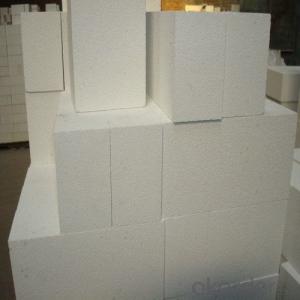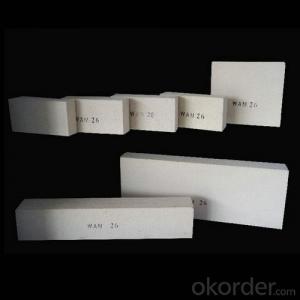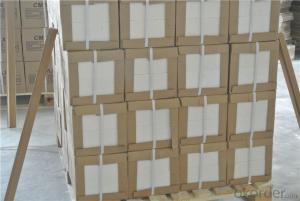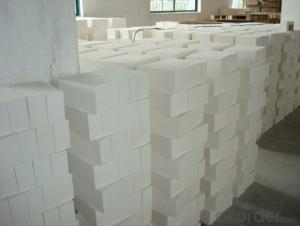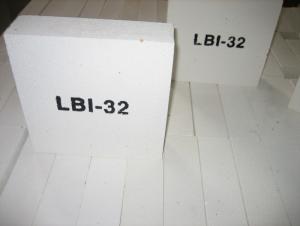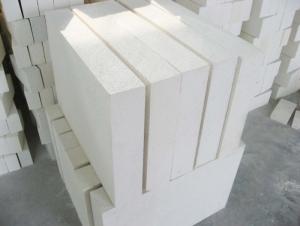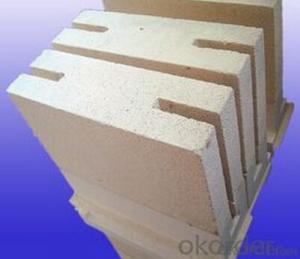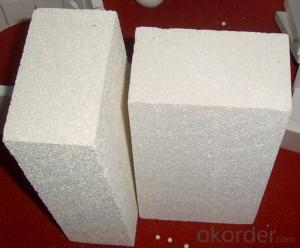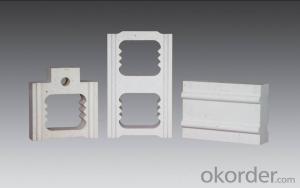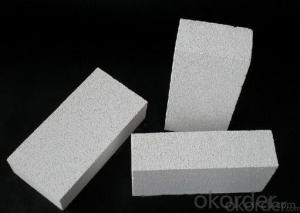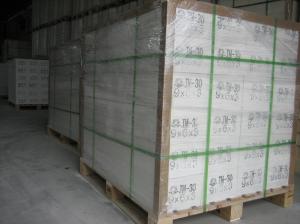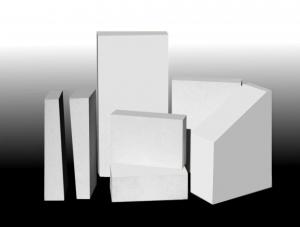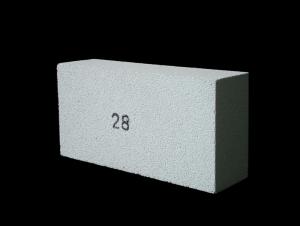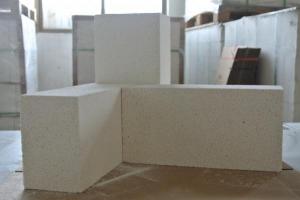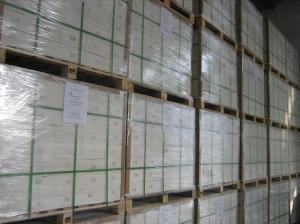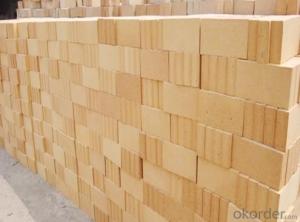Insulating Fire Brick - Refractory Mullite JM 30
- Loading Port:
- Shanghai
- Payment Terms:
- TT OR LC
- Min Order Qty:
- 5000 kg
- Supply Capability:
- 100000 kg/month
OKorder Service Pledge
OKorder Financial Service
You Might Also Like
Top insulation ceramic fiber blanket
General information of ceramic fiber blanket
Cmax ceramic fiber blanket is made of high quality kaolin clay, centrifugal high purity alumina and silica or blowing process. It's no asbestos. Double side acupuncture for easy installation provides a lot of tension or strength of the blanket.
Products are divided into standard, high pressure, HA and Hz, respectively, corresponding to the highest service temperature of 1000, 1100, 1200, and 1350
Characteristics of ceramic fiber blanket
Heat resistance
Light weight
Low thermal conductivity
Low heat storage
Thermal shock toughness
High tensile strength
Application of ceramic fiber blanket
Refractory fiber lining for petrochemical process heating furnace
Heat treatment furnace or intermittent (shuttle) kiln heat surface lining
General oven standby insulation
Heat sealing or kiln kiln car door
Electrical insulation
Ceramic fiber blanket
Common problem solutions
1. What products do you have?
We have all kinds of refractory bricks, refractory casting materials, mortar, cement, ceramic fiber products, etc..
Or you can browse our products to choose what you need.
2. How to control product quality?
With strict quality control system throughout the material selection and production process, we have the quality of refractory materials and ceramic fiber products to meet customer requirements.
From the selection of raw materials, the quality of our control to start. The quality certificate of the raw material is required, each batch of the products are to be tested in the use of the forward line. In the production process, the quality control by the workers, and then each piece of classification, and through the quality supervision and inspection.
3. Can you give me a brief introduction to the application of your product?
My company is mainly engaged in refractories in the steel, cement, glass, ceramics, petrochemical, electric power and other industries.
4. What information do you need if I need you?
In order to select the right products, we will provide us with information, such as the United States, technical data, order quantity, product application, etc..
If you have any questions, please contact us.
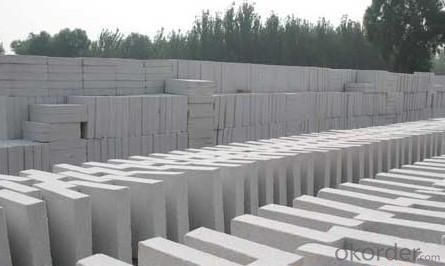
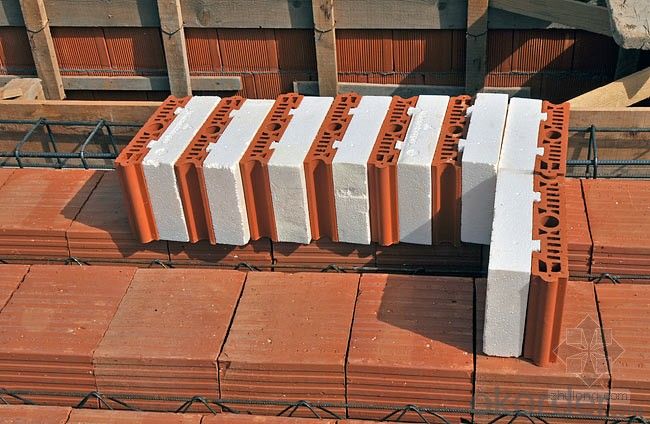
FAQ
1. Which products do you have?
We have all kinds of refractory brick, castable, mortar, cement, ceramic fiber products, etc.
Or you could browse our products to choose what you need.
2. How do you control the products quality?
With strict quality control system throughout the materials selection and production process, our refractory and ceramic fiber products quality is effectively controlled to meet customer requirements.
From the raw materials selecting, our quality control begin. The quality certificates of raw materials are required and each batch will be tested before using. During production, the quality control are conducted by workers and then each piece will be sorted and examined by quality supervise.
3. Can you give me a brief introduction of the application of your products?
We are mainly specializing in the refractory materials in iron and steel, cement, glass, ceramics, petrochemical, electric power Industry, etc.
4. If I need your offer, what information do you need?
In order to choose suitable products, it will be appreciated to provide us the information, such us specification, technical data, order quantity, products application etc.
If any question, please contact us freely.
- Q: Do insulating fire bricks require special storage conditions?
- Special storage conditions are not necessarily required for insulating fire bricks, but it is recommended to keep them in a well-ventilated, dry, and cool area. These bricks are made from lightweight materials that are designed to endure high temperatures and provide heat insulation. However, excessive moisture or exposure to extreme temperatures can potentially impact their performance and durability. It is advisable to shield the bricks from direct sunlight or rain, as extended exposure to these elements might cause harm. Additionally, arranging the bricks in an orderly manner and keeping them away from sharp objects or heavy loads can prevent any potential damage or deformation. In summary, while special storage conditions may not be compulsory, taking appropriate precautions can aid in preserving the quality and lifespan of the insulating fire bricks.
- Q: Can insulating fire bricks be used to build pizza ovens?
- Indeed, pizza ovens can be constructed using insulating fire bricks. These bricks are specifically designed to endure high temperatures and offer exceptional insulation, rendering them a suitable choice for pizza oven construction. With their low thermal conductivity, these bricks aid in retaining and evenly distributing heat throughout the oven. The insulating qualities of the bricks facilitate the attainment and maintenance of the desired temperature, ensuring efficient and consistent pizza cooking. Moreover, the lightweight nature of insulating fire bricks simplifies handling and installation during the construction process. All in all, due to their capacity to withstand high temperatures and provide efficient insulation, insulating fire bricks prove to be an excellent option for pizza oven construction.
- Q: Are insulating fire bricks suitable for insulation in steam boilers?
- Yes, insulating fire bricks are suitable for insulation in steam boilers. They are designed to withstand high temperatures and provide excellent thermal insulation, making them ideal for use in steam boilers to minimize heat loss and improve energy efficiency.
- Q: Can insulating fire bricks be used for insulation in autoclaves?
- Insulating fire bricks have the capability to be utilized for insulation within autoclaves. These bricks are specifically engineered to possess a minimal thermal conductivity, enabling them to proficiently retain heat and endure elevated temperatures. The insulation of autoclaves necessitates the ability to sustain a steady temperature and pressure, and insulating fire bricks excel in delivering exceptional insulation properties amidst these challenging circumstances. Furthermore, their robustness and durability render them well-suited for enduring the rigorous heat and pressure fluctuations commonly encountered in autoclaves. All in all, insulating fire bricks emerge as a dependable and efficient option for insulating autoclaves.
- Q: Are there any construction waste materials for composite thermal insulation bricks?
- Light insulation brick usually refers to hollow bricks, and the normal indoor partitions are made of such bricks, which can not increase the weight of the floor, and the sound insulation effect is good!
- Q: Can insulating fire bricks be used in boilers for steam generation?
- Yes, insulating fire bricks can be used in boilers for steam generation. Insulating fire bricks are made from lightweight materials that have high insulating properties, such as ceramic fibers or expanded clay. These bricks are designed to have low thermal conductivity, which means they are excellent at preventing heat transfer. In boilers, the insulation is crucial to reduce heat loss and improve energy efficiency. Insulating fire bricks can be used to line the walls, roof, and floor of the boiler combustion chamber. By providing a highly insulating barrier, they help to retain heat within the combustion chamber, allowing for more efficient steam generation. Furthermore, insulating fire bricks can withstand high temperatures, making them suitable for use in boilers where steam generation involves elevated temperatures. They are also resistant to thermal shock, which is important in boilers where temperature fluctuations can occur. Overall, insulating fire bricks are a valuable choice for boiler applications as they provide excellent insulation, withstand high temperatures, and contribute to improved energy efficiency in steam generation.
- Q: Can insulating fire bricks be used to build pizza ovens?
- Indeed, pizza ovens can be constructed using insulating fire bricks. These bricks are specifically designed to endure high temperatures and offer exceptional insulation, rendering them a suitable choice for pizza oven construction. With their low thermal conductivity, these bricks aid in retaining and evenly distributing heat throughout the oven. The insulating qualities of the bricks facilitate the attainment and maintenance of the desired temperature, ensuring efficient and consistent pizza cooking. Moreover, the lightweight nature of insulating fire bricks simplifies handling and installation during the construction process. All in all, due to their capacity to withstand high temperatures and provide efficient insulation, insulating fire bricks prove to be an excellent option for pizza oven construction.
- Q: Can insulating fire bricks be used for insulation in autoclaves?
- Yes, insulating fire bricks can be used for insulation in autoclaves. These bricks are designed to withstand high temperatures and provide excellent thermal insulation, making them suitable for use in autoclaves where temperature control and insulation are important.
- Q: Are insulating fire bricks resistant to hydrofluoric acid vapors?
- Insulating fire bricks are generally not resistant to hydrofluoric acid vapors. Hydrofluoric acid is a highly corrosive substance that can attack and dissolve a wide range of materials including many types of bricks. Insulating fire bricks are designed to withstand high temperatures and provide thermal insulation, but they are not specifically designed to resist chemical attacks. Therefore, it is important to exercise caution when using insulating fire bricks in environments where hydrofluoric acid vapors are present, as they may deteriorate or degrade over time. It is advisable to consult with the manufacturer or a chemical engineer to determine the best materials for handling hydrofluoric acid vapors.
- Q: Can insulating fire bricks be used in residential construction?
- Insulating fire bricks, also known as refractory bricks, are primarily designed for use in high-temperature applications such as industrial furnaces and kilns. They are specifically engineered to withstand extreme heat, have low thermal conductivity, and provide excellent insulation properties. While insulating fire bricks can be used in residential construction, they are not typically the go-to choice for such applications due to several reasons. Firstly, insulating fire bricks are significantly more expensive compared to other types of construction materials available in the market. This cost factor often makes them less desirable for residential projects, where budget considerations are crucial. Secondly, the primary purpose of insulating fire bricks is to provide thermal insulation in high-temperature environments. In residential construction, the need for such extreme insulation is relatively rare. Standard construction materials like concrete blocks, bricks, or insulation boards can usually provide adequate insulation for residential buildings. Lastly, insulating fire bricks are not as structurally strong as other construction materials, which may make them less suitable for load-bearing applications in residential construction. These bricks are typically used as a secondary layer or lining in industrial furnaces, rather than as a primary building material. In conclusion, while insulating fire bricks can technically be used in residential construction, they are not commonly employed due to their high cost, limited applicability, and structural limitations. Residential construction typically relies on more cost-effective and versatile materials to meet insulation and structural requirements.
Send your message to us
Insulating Fire Brick - Refractory Mullite JM 30
- Loading Port:
- Shanghai
- Payment Terms:
- TT OR LC
- Min Order Qty:
- 5000 kg
- Supply Capability:
- 100000 kg/month
OKorder Service Pledge
OKorder Financial Service
Similar products
Hot products
Hot Searches
Related keywords

